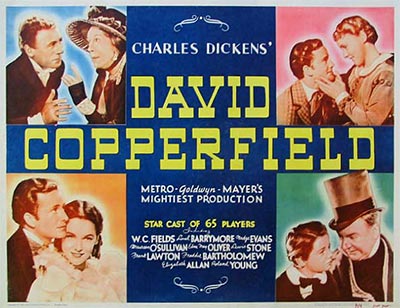
‘Perhaps the most superlative of the MGM supers was David Copperfield: even my aunts queued for it. When the studio went in for a Dickens, it did not do so half-heartedly… the Evening News ad contained, in addition to pleas to come early, a very unusual line:
‘WARNING. This film takes nearly two hours to screen.’
‘…An unthinkable length at that stage of talkie history … we were saddened at first, for that meant no Mickey Mouse; but in the event we forgave all concerned… even though the film’s second half now seems to need a more leisurely development: too many shredded incidents are compressed into it. ’
The film made a big impression:
‘Those early reels of Copperfield, while the hero is still a much-abused boy, were irresistibly easy to identify with, and for months I imagined myself as Freddie Bartholomew, taking care the following Christmas to be given an illustrated ‘book of the film’.’
Halliwell sums up the appeal of the film:
‘The key to the excitement was that while being overwhelmed by a luxurious production and uplifted by our involvement in a great novel, we were richly entertained by a story involving a gallery of grotesque characters… and what made it so perfect was that in the end we knew all could come right for young David, something which in those drab days we couldn’t guarantee for ourselves.’
Two famous producers established the tradition of film translations of epic novels:
‘Two men must share my gratitude for raising the literary tone of Hollywood during the thirties… David Selznick and Irving Thalberg… these epic entertainments, with their air of neatly combining enjoyment with instruction, came to the attention of my infant self via the good offices of the Bolton Capitol.’
Although Thalberg produced nearly every MGM film of the thirties, up until his death in 1936, this film would be Selznick’s project.

Halliwell |
| David Copperfield |